
Providing employees opportunities to communicate and collaborate easily helps make projects run seamlessly, helps drive innovation and builds productive workplace relationships. As the modern workplace is changing – often with fully remote or hybrid working set-ups – it’s more important than ever to ensure that your team is equipped with the right tools to communicate and stay connected. Adopting an enterprise social network will give your team a new way to communicate and work together.
Table of contents
What is enterprise social networking?
A brief history of enterprise social networking
What types of organizations would benefit from enterprise social networking?
The benefits of social business networks
The downsides of social business networks
How social networking software compares to intranets and alerting tools
The top 5 enterprise social networks
Tips for using ESN software effectively in your organization
What is enterprise social networking?
Enterprise social networking – also known as ESN – is how organizations connect their employees, business processes and other internal activities through social media, social networking and other similar technologies.
ESNs are often similar in nature to the social media platforms that employees use in their day-to-day private lives. The key difference is that an ESN is only available and accessible to employees within an organization.They’re created to provide organizations’ needs in mind to deliver seamless and secure employee communications.
Within an ESN, employees can communicate in various ways. This can include:
- Comments
- Direct/instant messages
- Status updates
- Topic threads
- Company-wide announcement broadcasts
ESNs offer the best value for businesses when they’re integrated with other business applications.
A brief history of enterprise social networking
Ever since people began regularly using the internet in the 1990s, they began to connect with and form communities around common interests. They also began using the internet to socialise and get to know other people.Eventually, this led to the rise of social media as we know it today: websites such as MySpace, Facebook, Twitter and LinkedIn came along, enabling people to use the internet to connect with others much more easily than before.
These social media sites paved the way for enterprise social networks to come along and be integrated into workplaces. Since the first enterprise social network, Yammer, was introduced, ESNs have evolved to include more features, integrate with other business tools and drive efficiencies and collaboration.
More on the topic: Yammer alternatives
What types of organizations would benefit from enterprise social networking?
A social network for companies is beneficial for most organizations.But larger organizations would get the most benefit out of adopting them.
This includes:
- Organizations where some or all team members are working remotely
- Organizations that are geographically dispersed
- Organizations where different work teams are collaborating on projects
- Organizations that are looking to improve communication, engagement and collaboration
- Organizations that have had problems with information sharing.
The benefits of social business networks
There are several benefits for businesses that introduce social network for enterprise to their workplace.
1. Enhanced communications
An ESN can help you say goodbye to cluttered inboxes and long email threads where people keep responding with “reply all”.Direct conversations can instead be initiated via the ESN through both public and private messaging channels. Employees can find it easier to keep track of conversations and are less likely to miss out on important information.
Company directories are more accessible in ESNs as they make it easy for people to find a co-worker and reach out to them.
2. Improved access to corporate knowledge
An enterprise social network provides employees with a platform where they can find important company files and documents, such as project-related specs and data, training guides and resources, research papers, policies and procedures and more.
3. Better ways to collaborate
When you make all your project data, shared documents and assigned tasks available in a single platform, team members will always know how the project is tracking, what needs to be done and when it needs to be done. This is particularly helpful for distributed teams.
4. Opportunities for relationship building
You can help to build relationships among employees by establishing informal and/or fun channels for your ESN. These virtual spaces are where people can discuss their different interests, celebrate milestones and other successes. By encouraging these informal conversations, people get to know one another better and feel more engaged with their team and the workplace. This is especially useful when you have remote workers or teams who are not co-located.
5. Strengthens corporate culture
ESNs can help contribute to your company’s corporate culture, particularly when you have remote team members or a geographically dispersed organization. The ESN can help to emphasize the positives of your corporate culture, particularly if you have new or remote employees who don’t attend the physical office every day. When exposed to the conversations other colleagues are having on the ESN, these employees will get a clear picture of the company culture and can feel ease at participating in it.
The downsides of social business networks
Of course, there are some drawbacks to using enterprise social networks in the workplace. These are mostly manageable if you are mindful of them and put parameters in place to deal with them:
1. A source of distraction
An enterprise ESN has the potential to be just as distracting to your employees as public social media platforms are. While the purpose of the ESN is to bolster communication and collaboration within teams, some employees may spend too much time on the ESN chatting and socializing instead of focusing on their work.
Notifications from ESNs can also be distracting and cause people to lose concentration and focus as they are being disrupted from their tasks.In fact, it can contribute to information overload – much the same way as too many emails throughout the day can. People may miss important or critical information. A standalone alerting tool such as DeskAlerts can be used alongside ESNs to ensure that any urgent and critical messages from management to employees are seen.
2. Messaging and notifications outside of work hours
While ESNs enable real-time communication between employees, there is scope for this to bleed into peoples’ personal time. It’s important to set parameters about how and when the ESN should be used: colleagues should not have an expectation that they can contact a colleague at any time of day or night and receive a quick response.
3. Conversations could become siloed
Organizations implement ESNs to help break down information silos and to encourage greater collaboration and knowledge sharing. However, it can become easy for them to do the very thing they are trying to avoid. Particularly if people don’t keep conversations to the channels that they are meant to be in – it can result in fractured conversations and other employees having to search through multiple channels to find the conversation threads they need.
4. Potential HR violations
It’s important that expectations and requirements around employee conduct while using the ESN are the same as they would be anywhere else in your workplace. This means that people must conduct themselves professionally and respectfully. Bullying, harassment, sexism, racism and other offensive conduct should have the same consequences as in the physical office environment.
Depending on your jurisdiction there are other potential violations, such as privacy, that could occur if ESNs are misused.
How social networking software compares to intranets and alerting tools
Social networking software, corporate intranets and alerting tools have some things in common, but they are fundamentally different. They have different features and serve different purposes. They do, however, work well in conjunction with each other. One of the tenets of best practice internal communication is to use a variety of tools and channels to maximize the impact of messaging.
- Intranets: are a collection of traditional web pages that are accessed via web browsers, but not available to people outside of the organization. They’re largely used to publish internal news, policies, procedures and key corporate information. There are a range of additional features that can be added to make them more interactive, for example, comments or blog posts or social reactions.
- Social networking software: contains a range of functions and tools to promote collaboration and information sharing, including chat, message threads, commenting, photo sharing, social reactions, news feeds and more.
- Alerting tools: stand-alone software systems such as DeskAlerts that can be used to send notifications to employees, bypassing email and intranet, so that urgent information can be received. These tools are useful when you don’t need to have two-way communications.
The top 5 enterprise social networks
There are many different enterprise social platforms to choose from. When you carry out an enterprise social networks comparison you may find that your organization’s operational needs are best suited to one over all the others. These are some of the most popular social networks for companies today:
1. Slack
Slack is communications software that unifies all of its channels into a searchable and easy-to-access location. It supports real-time messaging as well as video and voice calls, and also enables file sharing and archiving completely within the platform. Slack can be integrated with more than 1500 other workplace apps making it very customizable and flexible.
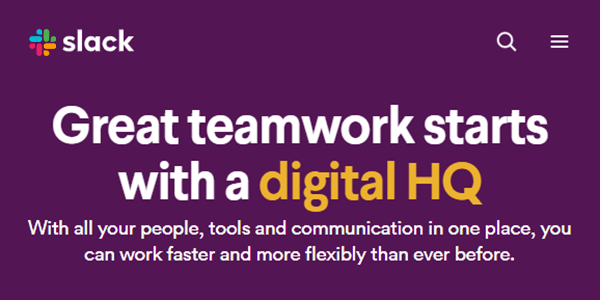
2. Yammer
Yammer has been around for a long time now as part of Microsoft team environments. It provides a range of channels for businesses to enhance internal communications and provides opportunities for collaboration – including in document creation. Yammer is easy to integrate with other platforms and is available on mobile devices.
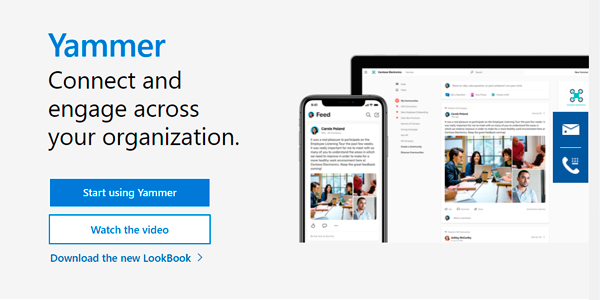
3. Workplace by Facebook
Workplace by Facebook is a private social network for enterprise that has the same look and feel as the regular Facebook social media platform, and includes similar tools such as the ability to join groups, share news and organize events. For companies, the app can be used as a centralized communications hub where management and staff can share messages and information.
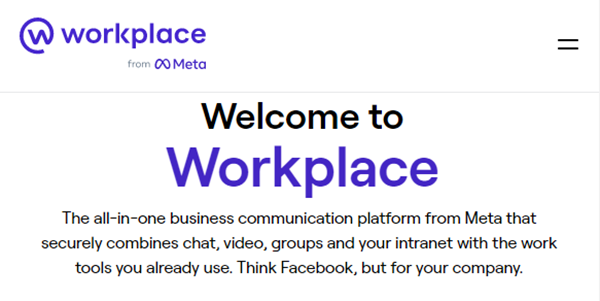
4. Jive
Jive includes communication tools that are designed to increase productivity and employee engagement. This includes chat, groups, a news feed, video conferencing, gamification, surveys and training. Different channels and spaces can be created for individual teams within an organization so they have access to their own news and resources.
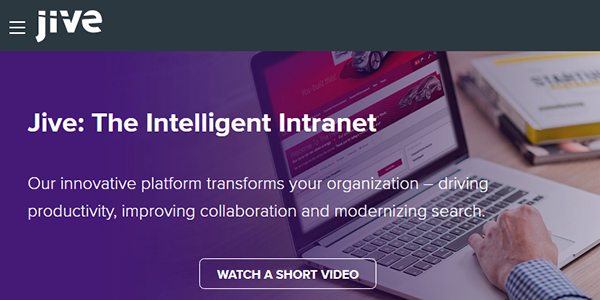
5. Jostle
Jostle is a business social network platform that is designed to create a virtual office environment where colleagues can come together and work on projects, share successes and solve problems together. It can be used for everything from publishing corporate news and announcements through to facilitating one-on-one conversations, and can be integrated with many other business tools.
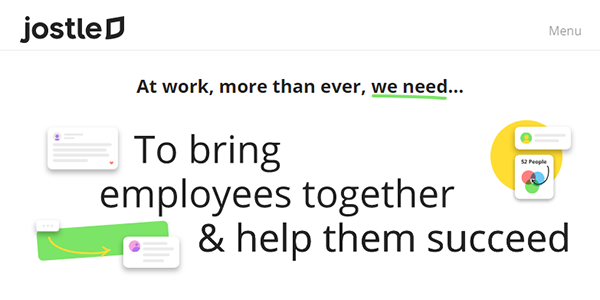
Tips for using ESN software effectively in your organization
When it’s time to deploy enterprise social network software in your workplace, these are the best practice tips to help things go smoothly:
- Make sure you’ve selected an ESN that will integrate itself into your team’s existing work – not the other way around. You don’t want to create cumbersome extra work.
- The best enterprise social networks can be easily integrated with existing IT infrastructure and tools to help make workflows easier and aggregate what you need to get the job done.
- Ensure you have developed protocols around the use of the ESN, such as expected behavior and conduct, when and how the channels can be used etc.
- Determine who will be responsible in your organization for maintaining the ESN. In some companies it may be the IT team, while in others it may be communications or HR.
- Try to keep the ESN as a fun and easy-to-use tool, otherwise people will avoid it
***
Enterprise social networks are a fantastic tool to improve collaboration and communication in the modern workplace, in addition to other digital tools and resources such as DeskAlerts. When you invest in the right internal communications tools you will find that you reap the rewards in terms of productivity, profitability and improved team morale.
FAQ:
What Is Enterprise Social Networking Software?
Enterprise social networking software is a collaborative tool that helps employees work together and share ideas, documents and build relationships.
How to Choose the Best Enterprise Social Networking System?
To choose an enterprise social networking system you should consider the side of your company and what your needs are. This will help you to prepare a list that contains the essential expectations and requirements you have from an enterprise social network so you can find one that ticks the boxes you need/
What are Examples of Enterprise Social Networking Software?
Examples of enterprise social networking software include Yammer, Facebook for Business, Slack and Jive.
Types of Enterprise Social Networking Software
There are several different types of enterprise social networking tools to be aware of:
- Mobile apps
- Instant messengers
- Group chats
- Blogs, wikis and posts
- Microblogging
- Video chat
- Videoconferencing
Key Features of Enterprise Social Networking Software
These are the most common and most popular features of different social networking software platforms:
- Social dashboards
- Content creation abilitu
- Comments sections
- Tagging
- Customizable user profiles
- Messaging functions
Benefits of Enterprise Social Networking Software
The benefits of enterprise social networking software include:
- A cost-effective way to improve communication and collaboration
- A platform that you can grow and evolve as your organization changes
- Improves knowledge sharing in the workplace
- Builds, develops and strengthens workplace relationships
- Improves employee engagement
- Helps to foster a strong corporate culture
 Caroline Duncan
Caroline Duncan












